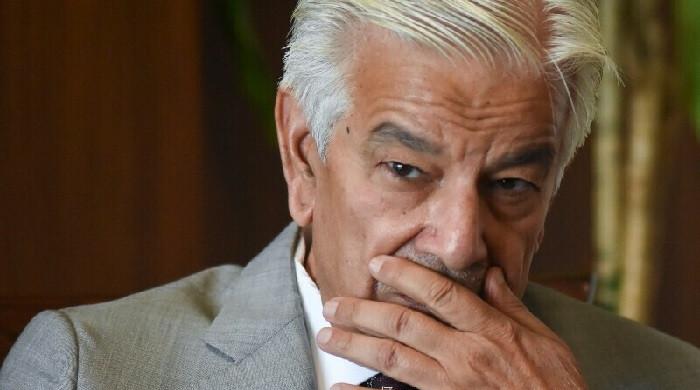- Accuses the modi government of the election driven warmer.
- Warns India of “devastating consequences” in any misadventure.
- Says Pakistan’s answer will be quick, decisive and unforgettable.
Defense Minister Khawaja Asif, early on Sunday, responded sharply to what he called provocative statements from New Delhi’s top security institution, saying that India would be “buried under the wreck of its war plane, Inshallah.”
In a post on X, ASIF described recent comments from India’s military and political leaders as a failed attempt to restore their lost credibility. He said their statements showed pressure at the top.
“After such a decisive 6-0 defeat if they try again, [Pakistan’s] The result is only better, ”the minister wrote. He added that public opinion in India had turned strongly against the reigning party after this defeat, and that was reflected in the words of the leaders.
The Minister of Defense also said, “Pakistan is a state built in the name of Allah, our defenders are Allah’s soldiers. This time India, Inshallah, will be buried under Vrak for its aircraft. Allahu Akbar.”
Previously, the military spokesman had also responded to the same comments from Indian security circles.
In response to India’s war rhetoric, the country’s armed forces warned that “provocative and jingoist remarks” from senior Indian security officials risk producing pretext for aggression and could lead to “cataclysmic destruction”.
Inter-Services Public Relations (ISPR) said such comments suggested a renewed attempt to produce arbitrary pretext for aggression that would have “serious consequences for peace and stability in South Asia”.
A day earlier, Indian Air Force Chief Amar Preet Singh claimed that India set up five Pakistani fighter jets in the F-16 and JF-17 class during the intense matches between the nuclear armed neighbors in May.
“As for air defense part, we have evidence of a wide range of strike … along with the five fighters, high-tech fighters between the F-16 and JF-17 class, our system tells,” Singh told journalists at the Indian Air Force’s annual press conference.
However, he did not provide any evidence of supporting his claim.
Pakistan’s military slammed India for too long to portray itself as a victim, while “Stoking of violence and committing terrorism in South Asia and beyond” and said this tale has been debunked.
ISPR added that the international community now recognizes India as “the true face of cross -border terrorism and episent of regional instability”.
With reference to events earlier this year, ISPR said that Indian aggression had previously brought “two nuclear power to the brink of a major war” and criticized Indian leadership for the apparent ignoring “the wreck of his fighter jets and anger from Pakistan’s long -distance vectors”.
On the recent comments of India’s Defense Minister and Service Managers, the military warned that a fresh round of hostilities “could lead to cataclysmic destruction”.
It also warned that Pakistan “should not hold back” and “must resolutely respond without qualifications or restraint” if the hostilities are triggered.
The statement added that those seeking to establish a “new normal” should be aware that Pakistan himself has established a new normal response that will be quick, decisive and destructive.
On rhetoric of erasing Pakistan from the map, Ispr said India “should know that if the situation comes, the deletion will be mutual.”
Separately described security sources India’s threats like Tom Bluster. They said that the armed forces were fully prepared to defend the country.
The May matches, the worst between the old enemies for decades, were triggered by a terrorist attack on tourists in Indian illegally occupied Jammu and Kashmir’s (IIOJK) Pahagam area, as New Delhi said was supported by Pakistan.
Islamabad denied involvement in the Kashmir attack, killing 26 men and was the worst attack on civilians in India since the Mumbai attacks in 2008.
After the incident, India killed several innocent civilians in unprovoked attacks on Pakistan for three days before Pakistan armed forces reciprocated in the defense with the successful operation Bunyan-Um-Maroos.
Pakistan lowered six IAF fighters, including three rafale, and dozens of drones. After at least 87 hours, the war between the two nuclear armed nations ended on May 10 with a ceasefire agreement broken by the United States.



